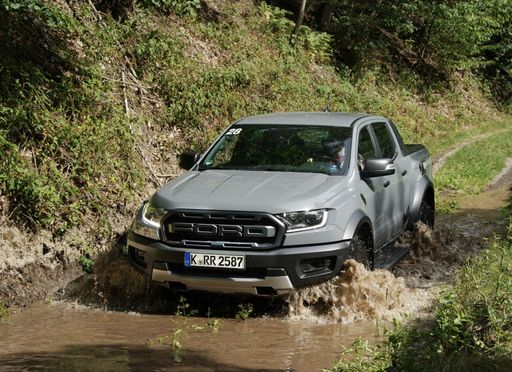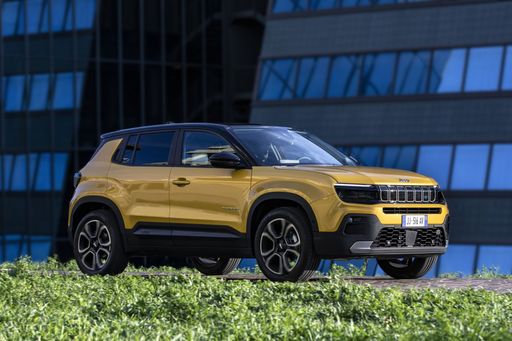Ford Ranger VS Jeep Avenger
Ford Ranger
The Ford Ranger stands out in the pickup market with its robust build and versatile capabilities, making it a popular choice for both work and leisure. Its modern design is complemented by a well-equipped interior, providing comfort and advanced technology. Whether tackling challenging terrains or cruising through the city, the Ranger delivers a reliable and dynamic driving experience.
more informationJeep Avenger
The Jeep Avenger is a compact SUV that brings a blend of rugged design and modern technology, making it ideal for both urban and off-road adventures. Its robust build and distinctive styling capture Jeep's iconic spirit while offering a comfortable and refined driving experience. With advanced safety features and a versatile interior, the Avenger caters to a wide range of drivers looking for practicality and excitement.
more informationFord Ranger
Jeep Avenger

|

|
| from price from £34,500 | from price from £21,400 |
General |
|
|---|---|
|
Model Year
2022 - 2024
|
Model Year
2023
|
|
CO2 Efficiency Class
G
|
CO2 Efficiency Class
A, C, D
|
|
Trim Level
Limited 4x4, Limited 4x4 Automatik, Tremor e-4WD Automatik, Wildtrak 4x4 Automatik, Wildtrak e-4WD Automatik, XL 4x4, XLT 4x4, XLT 4x4 Automatik, Wildtrak X e-4WD Automatik, MS-RT e-4WD Automatik, Platinum e-4WD Automatik, e-4WD Automatik
|
Trim Level
Longitude, Altitude, Summit
|
|
Brand
Ford
|
Brand
Jeep
|
Costs and Consumption |
|
|
Price
34500 - 68800
£
|
Price
21400 - 37300
£
|
|
Verbrauch L/100km
8.4 - 13.8
L
|
Verbrauch L/100km
-
|
|
Verbrauch kWh/100km
-
|
Verbrauch kWh/100km
15.4
kWh
|
|
Electric Range
-
|
Electric Range
400
km
|
|
Battery Capacity
-
|
Battery Capacity
51
kWh
|
|
Monthly Costs
2026
£
|
Monthly Costs
-
|
|
Cost per Km
81.1
ct
|
Cost per Km
-
|
|
co2
220 - 315
g/km
|
co2
0, 111, 130
g/km
|
|
Fuel tank capacity
80
L
|
Fuel tank capacity
44
L
|
Dimensions and Body |
|
|
Body Type
Pick-Up
|
Body Type
SUV
|
|
Seats
2 - 5
|
Seats
5
|
|
Doors
2 - 4
|
Doors
5
|
|
Curb weight
2082 - 2486
kg
|
Curb weight
1180 - 1520
kg
|
|
Trunk (boot) capacity
-
|
Trunk (boot) capacity
355 - 380
L
|
|
Length
5370 - 5420
mm
|
Length
4084
mm
|
|
Width
1918 - 1968
mm
|
Width
1776
mm
|
|
Height
1868 - 1922
mm
|
Height
1528 - 1534
mm
|
|
Payload
676 - 1108
kg
|
Payload
394 - 502
kg
|
Engine and Performance |
|
|
Engine Type
Diesel, Petrol
|
Engine Type
Electric, Petrol Mild Hybrid, Petrol
|
|
Fuel Type
Diesel, Super
|
Fuel Type
Electricity, Super
|
|
Transmission
Manual, Automatic
|
Transmission
Automatic, Manual
|
|
Transmission Detail
Manual Gearbox, Automatic Gearbox
|
Transmission Detail
Reduction Gearbox, Automated Manual (Dual-Clutch), Manual Gearbox
|
|
Drive Type
All-Wheel Drive
|
Drive Type
Front-Wheel Drive
|
|
Horsepower (HP)
170 - 292
HP
|
Horsepower (HP)
100 - 156
HP
|
|
Acceleration 0-100km/h
11.6, 12.1, 10.5, 0, 11.3, 12, 8.7, 7.9
s
|
Acceleration 0-100km/h
9 - 10.9
s
|
|
Max Speed
180 - 190
km/h
|
Max Speed
150 - 184
km/h
|
|
Torque
405 - 600
Nm
|
Torque
205 - 260
Nm
|
|
Number of Cylinders
4 - 6
|
Number of Cylinders
3
|
|
Power (kW)
125 - 215
kW
|
Power (kW)
74 - 115
kW
|
|
Engine capacity
2000 - 3000
cm3
|
Engine capacity
1199
cm3
|
|
Top speed
180 - 190
km/h
|
Top speed
150 - 184
km/h
|
Ford Ranger
A Comprehensive Look at the Ford Ranger: Versatility Meets Innovation
The Ford Ranger has long been a staple in the world of pick-up trucks, renowned for its robust design and versatility. Whether for rugged off-road adventures or everyday utility tasks, the Ford Ranger continues to be a frontrunner in the pick-up segment. In this article, we explore the technical details and innovative features that set the latest versions of the Ford Ranger apart from its competitors.
Powertrain Performance: A Range of Choices
The Ford Ranger offers a selection of powerful engines, catering to a diverse set of user requirements. Engine options range from the fuel-efficient 2.0-litre EcoBlue diesel engine to the robust 3.0-litre EcoBoost petrol engine, offering impressive outputs from 170 to 292 PS. These engines are paired with either a manual or an advanced automatic transmission, both providing smooth shifting and optimised performance across various driving conditions.
The Ranger’s all-wheel-drive system ensures a robust off-road capability while maintaining a composed ride on urban roads. With torque figures ranging between 405 Nm and 600 Nm, the Ranger guarantees ample pulling power whether you're on or off the beaten track.
Fuel Efficiency and Environmental Considerations
Recognising the importance of balancing performance with efficiency, the Ford Ranger delivers competitive fuel consumption figures ranging from 8.4 to 13.8 litres per 100 km. Despite its robust performance capabilities, the Ranger remains mindful of its environmental footprint, maintaining a functional balance between power and efficiency with a CO2 efficiency class of G.
Advanced Safety and Technology Features
Incorporating cutting-edge technology, the Ford Ranger is equipped with a suite of safety features designed to protect both passengers and payload. Among these are adaptive cruise control, lane-keeping assistance, and a pre-collision assist system, enhancing the driver's ability to navigate both rural roads and busy motorways safely and efficiently.
Moreover, the interior tech suite includes an intuitive infotainment system, complete with connectivity options for seamless integration of smartphones and smart devices. This ensures drivers and passengers can stay connected and entertained on all journeys.
Customisation and Comfort
The Ford Ranger offers a variety of trim levels, allowing customers to tailor the vehicle to their specific needs. From the rugged XL 4x4 to the luxurious Platinum e-4WD Automatik, there is a model to suit every preference and requirement. Equipment lines such as Wildtrak and MS-RT add enhanced styling and additional features for those seeking a more distinctive and upscale appearance.
Inside, the Ranger provides comfortable seating configurations for up to five passengers, with premium materials and ample storage space to ensure every journey is a pleasant experience. Users can also benefit from a range of comfort features, including climate control, premium audio systems, and adjustable seating.
Practicality Meets Payload
The Ford Ranger excels in practicality with its impressive payload capacity and spacious cargo bed, suitable for carrying everything from work equipment to recreational gear. With a maximum payload of up to 1,108 kg, the Ranger is more than capable of handling heavy loads, making it an ideal choice for both professional and personal use.
Additionally, the robust chassis and durable build quality provide long-lasting performance even under the most demanding conditions, ensuring reliability and endurance in the long term.
Conclusion: A Resilient Companion for All Terrains
With its capable engine choices, outstanding off-road capabilities, and a host of advanced features, the Ford Ranger continues to lead the way in the pick-up truck category. Whether for practical utility, adventurous pursuits, or simply as a reliable daily vehicle, the Ranger delivers on all fronts – a true testament to Ford’s commitment to innovation and quality in the automotive industry.
Jeep Avenger
Unveiling the Jeep Avenger: A New Era of Innovation
The Jeep Avenger marks a significant milestone in automotive evolution, blending ruggedness with modern-day advancements. Established within the SUV category, the Avenger offers an eclectic mix of powertrains, including electric and hybrid options, catering to the diverse requirements of the modern motorist.
Powertrain Options: Efficiency Meets Performance
The Jeep Avenger presents multiple powertrain configurations, each designed to harmonise performance with efficiency. The electric version boasts a formidable 156 PS and a battery capacity of 51 kWh, enabling a remarkable 400 km of electric range. This places it at the forefront of environmentally friendly travel with a consumption of merely 15.4 kWh/100km.
Additionally, for those favouring classic combustion engines, the 1.2 e-Hybrid and the purely petrol 1.2 GSE T3 offer 100 PS and incorporate innovative mild-hybrid technology to enhance fuel efficiency while maintaining a spirited driving experience.
Advanced Engineering: Technology and Design
At the heart of the Jeep Avenger lies a well-engineered chassis, tailored for both agility and comfort. Measuring 4084 mm in length, 1776 mm in width, and up to 1534 mm in height, the Avenger ensures ample space within a compact footprint, ideal for urban manoeuvrability.
The vehicle supports its robust engineering with meticulous design details, from its substantial boot capacity of up to 380 litres to its five-door configuration, seamlessly blending functionality with aesthetic appeal.
Driving Dynamics and Performance
Front-wheel drive ensures that the Avenger's power is perfectly harnessed for both city streets and off-road trails. The vehicle's acceleration capabilities vary between 9 and 10.9 seconds from 0-100 km/h, a testament to its spirited performance ethos. With a maximum speed ranging up to 184 km/h, the Avenger is built to deliver thrilling drives.
Sustainability at the Forefront
As a reflection of Jeep's commitment to sustainability, the Avenger achieves commendable CO2 efficiency ratings spanning classes A to D. The electric model stands out with zero emissions, while hybrid options offer competitive CO2 figures, appealing to eco-conscious drivers.
Pricing and Trim Levels
The Jeep Avenger is strategically priced between 25,000 and 43,500 €, ensuring accessibility for a broad range of customers. With available trim levels such as Longitude, Altitude, and Summit, prospective buyers can tailor their vehicles to suit individual preferences, choosing from different feature sets and functionalities.
Conclusion: The Jeep Avenger's Promise
The Jeep Avenger is not just a new vehicle; it embodies a shift towards innovative, efficient, and dynamic motoring. By merging advanced technology with Jeep's legendary prowess, the Avenger is poised to redefine expectations within the SUV sector, offering both cutting-edge performance and unyielding reliability.
